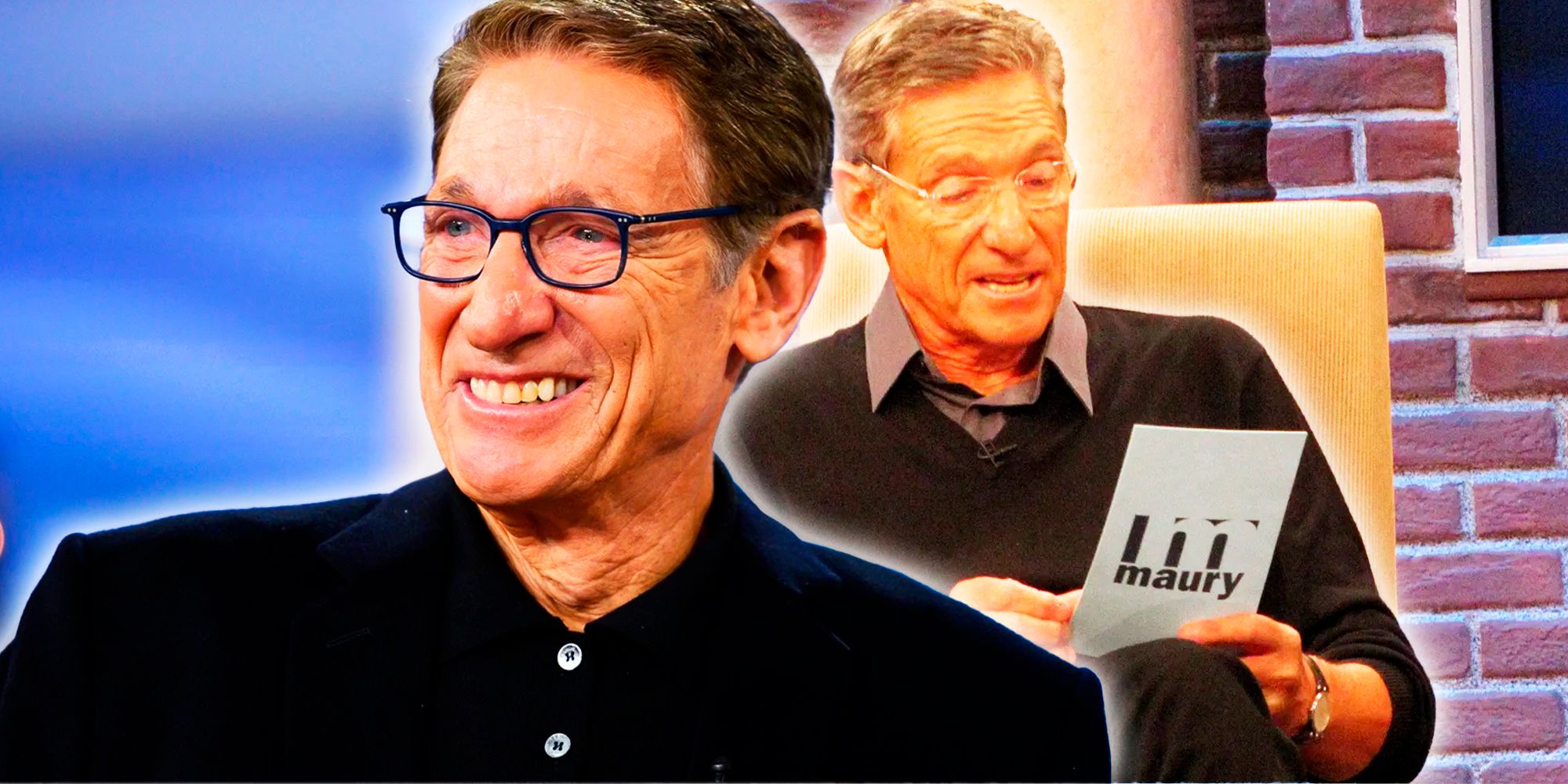Maury Maury Maury: Unpacking The Enduring Legacy Of Daytime TV
The phrase "Maury Maury Maury" instantly conjures images of dramatic paternity test reveals, lie detector results, and the unforgettable reactions of guests on one of television's most iconic and controversial daytime talk shows. For over three decades, Maury Povich carved out a unique niche in the landscape of American television, becoming synonymous with the raw, often chaotic, and undeniably captivating spectacle of personal drama played out for millions. His show wasn't just entertainment; it was a cultural phenomenon that sparked countless conversations, debates, and even parodies, solidifying its place in the annals of pop culture history.
From its humble beginnings as "The Maury Povich Show" to its evolution into the highly stylized "Maury" we remember, the program consistently pushed boundaries, drawing in audiences with its promise of revealing "the truth." While often criticized for its sensationalism and perceived exploitation of guests, the show's immense popularity cannot be denied. It tapped into fundamental human curiosities about relationships, family secrets, and the desire for definitive answers, creating a legacy that continues to resonate long after its final episode. This article delves into the enduring impact of "Maury," exploring its format, its cultural footprint, and the complex ethical questions it raised, offering insights into why this particular brand of daytime television captivated so many for so long.
Table of Contents
- Maury Povich: A Biographical Sketch
- The Rise of Maury: From Newsman to Daytime Icon
- The Maury Formula: Unraveling the Show's Success
- The Cultural Impact of Maury Maury Maury
- Ethical Dilemmas and Criticisms of The Maury Show
- Beyond the Screams and Applause: Maury's Legacy
- The End of an Era and What Comes Next for Daytime TV
- Maury Maury Maury in the Digital Age
Maury Povich: A Biographical Sketch
Before becoming the undisputed king of paternity tests, Maurice Richard Povich, known universally as Maury Povich, had a long and distinguished career deeply rooted in journalism. Born on January 17, 1939, in Washington D.C., he hailed from a family deeply embedded in the media landscape; his father, Shirley Povich, was a renowned sportswriter for The Washington Post, a figure who undoubtedly influenced Maury's early career aspirations and his approach to public communication. This upbringing instilled in him a keen sense of storytelling, an understanding of public interest, and a knack for connecting with diverse audiences, qualities that would later become hallmarks of his iconic talk show.
Maury began his professional journey in radio, eventually transitioning to television news in the early 1960s. His early career saw him work as a sportscaster, reporter, and anchor for various local stations across major U.S. cities, including Philadelphia, Chicago, Los Angeles, and San Francisco. This extensive experience in local news provided him with a solid foundation in live broadcasting, interviewing techniques, and the art of engaging a wide viewership. A pivotal stepping stone in his career was his tenure as a news anchor for "A Current Affair" in the late 1980s. This tabloid news program, known for its sensationalized reporting and focus on dramatic human interest stories, served as a crucial training ground, preparing him for the unique blend of news and entertainment that would ultimately define his later work in daytime television. His gradual transition from hard news to the more sensational world of talk shows reflected the evolving landscape of television itself, as broadcasters sought new ways to capture audience attention.
Personal Data and Biodata: Maury Povich
| Category | Detail |
|---|---|
| Full Name | Maurice Richard Povich |
| Date of Birth | January 17, 1939 |
| Place of Birth | Washington D.C., U.S. |
| Nationality | American |
| Occupation | Television Presenter, Journalist, Talk Show Host |
| Spouse | Phyllis Minkoff (m. 1962; div. 1979), Connie Chung (m. 1984) |
| Children | 2 (with Phyllis Minkoff), 1 adopted (with Connie Chung) |
| Education | University of Pennsylvania (B.A. in Journalism) |
| Years Active | 1962–2022 (Television) |
| Known For | Host of The Maury Povich Show / Maury |
The Rise of Maury: From Newsman to Daytime Icon
Maury Povich launched "The Maury Povich Show" in 1991, initially positioning it as a more traditional talk show, focusing on current events, celebrity interviews, and general interest topics. This early iteration aimed to compete with established giants like "The Oprah Winfrey Show" by offering a more conventional, interview-based format. However, as the highly competitive daytime talk show market evolved throughout the 1990s, dominated by figures like Oprah and the emerging sensationalism of shows like "The Jerry Springer Show," Maury's program began a significant strategic pivot. It gradually shifted its focus towards more sensational and intensely personal stories, a move that would ultimately define its enduring appeal and solidify its unique brand identity.
This transformation wasn't accidental; it was a calculated response to audience demand and the burgeoning appetite for reality-based, conflict-driven entertainment. The show found its true calling by zeroing in on highly emotional and often volatile personal conflicts, particularly those involving family secrets, relationship disputes, and identity questions. This niche allowed "Maury" to stand out in an increasingly crowded field. The program's ability to consistently deliver dramatic reveals, often culminating in the now-famous "You are/are not the father!" declaration, cemented its place in pop culture. This pivot was a masterstroke, transforming a relatively conventional talk show into a cultural touchstone recognized globally. The phrase "Maury Maury Maury" became a shorthand for high-stakes personal drama, instantly recognizable even to those who rarely watched the show, demonstrating its pervasive influence.
- Belco Credit Union
- Jerrys Seafood
- Lesbian Hentai
- Jacob Burns Theater Pleasantville New York
- City Of Houston Water
The Maury Formula: Unraveling the Show's Success
The unparalleled success of "Maury" wasn't simply due to its controversial topics; it was meticulously crafted through a repeatable, highly effective formula that maximized drama and audience engagement. Each episode, regardless of the specific conflict, followed a predictable yet compelling narrative arc: a problem presented by one or more guests, a dramatic build-up to a pivotal reveal, and then the often explosive, unscripted aftermath. This consistent structure provided a profound sense of anticipation and catharsis for viewers, making it incredibly difficult to turn away, fostering a loyal viewership that spanned generations.
Paternity Tests and the Truth Revealed
Undoubtedly, the paternity test segments were the absolute cornerstone and most iconic feature of the "Maury" show. These episodes typically featured a woman seeking to definitively identify the biological father of her child, often amidst heated accusations, denials, and emotional outbursts from the alleged fathers and their families. The tension in the studio would build to an almost unbearable peak as Maury would hold
:max_bytes(150000):strip_icc()/tsdmapo_ec001_h-2000-f989ed4a39ae4e5199449e5d669eed7f.jpg)


Detail Author:
- Name : Betty Grady
- Username : juvenal.thiel
- Email : rdach@hotmail.com
- Birthdate : 1985-07-07
- Address : 7520 Stanton Highway Apt. 429 Devenborough, TN 98138
- Phone : +16789743909
- Company : Considine Inc
- Job : Carpenter Assembler and Repairer
- Bio : Omnis saepe commodi repellat. Optio et ipsam nostrum est ut aliquam praesentium. Ipsam non perspiciatis eos aspernatur expedita explicabo.
Socials
twitter:
- url : https://twitter.com/donnellyk
- username : donnellyk
- bio : In cupiditate necessitatibus consequuntur soluta perspiciatis explicabo iusto. Optio et non voluptatem molestiae. Similique aut sed vel est ratione labore.
- followers : 2786
- following : 2892
linkedin:
- url : https://linkedin.com/in/kaleb_donnelly
- username : kaleb_donnelly
- bio : Aspernatur possimus quo ut.
- followers : 5826
- following : 2750
facebook:
- url : https://facebook.com/donnelly2003
- username : donnelly2003
- bio : Repellat numquam totam laborum quis.
- followers : 977
- following : 843
instagram:
- url : https://instagram.com/kaleb_official
- username : kaleb_official
- bio : Quae quibusdam ut vitae. Aliquid qui fugiat ipsam et sint.
- followers : 1005
- following : 1020